Business Environment, Innovation, and CSR Report: Aveva Plc
VerifiedAdded on 2020/10/22
|10
|2952
|481
Report
AI Summary
This report provides an in-depth analysis of Aveva Plc, a British multinational information technology company. It begins by exploring the importance of innovation in business, particularly within the context of Aveva Plc, and then delves into the role of technology and technological change in economic progress, highlighting the UK's ICT sector and its contributions. The report then examines Aveva's innovative software solutions, its commitment to customer satisfaction, and its various technological advancements. Furthermore, it discusses corporate social responsibility (CSR), its importance, and benefits, alongside an overview of corporate governance. The report concludes by applying Archie Carroll's CSR model to Aveva Plc, providing a framework for understanding its responsibilities and practices. The report highlights the importance of innovation in driving economic growth and maintaining a competitive edge in the global market.

Business
Environment
Environment
Paraphrase This Document
Need a fresh take? Get an instant paraphrase of this document with our AI Paraphraser

Table of Contents
INTRODUCTION...........................................................................................................................3
TASK 1 ...........................................................................................................................................3
TASK 2............................................................................................................................................6
CONCLUSION ...............................................................................................................................8
REFERNCES ..................................................................................................................................9
.........................................................................................................................................................9
INTRODUCTION...........................................................................................................................3
TASK 1 ...........................................................................................................................................3
TASK 2............................................................................................................................................6
CONCLUSION ...............................................................................................................................8
REFERNCES ..................................................................................................................................9
.........................................................................................................................................................9
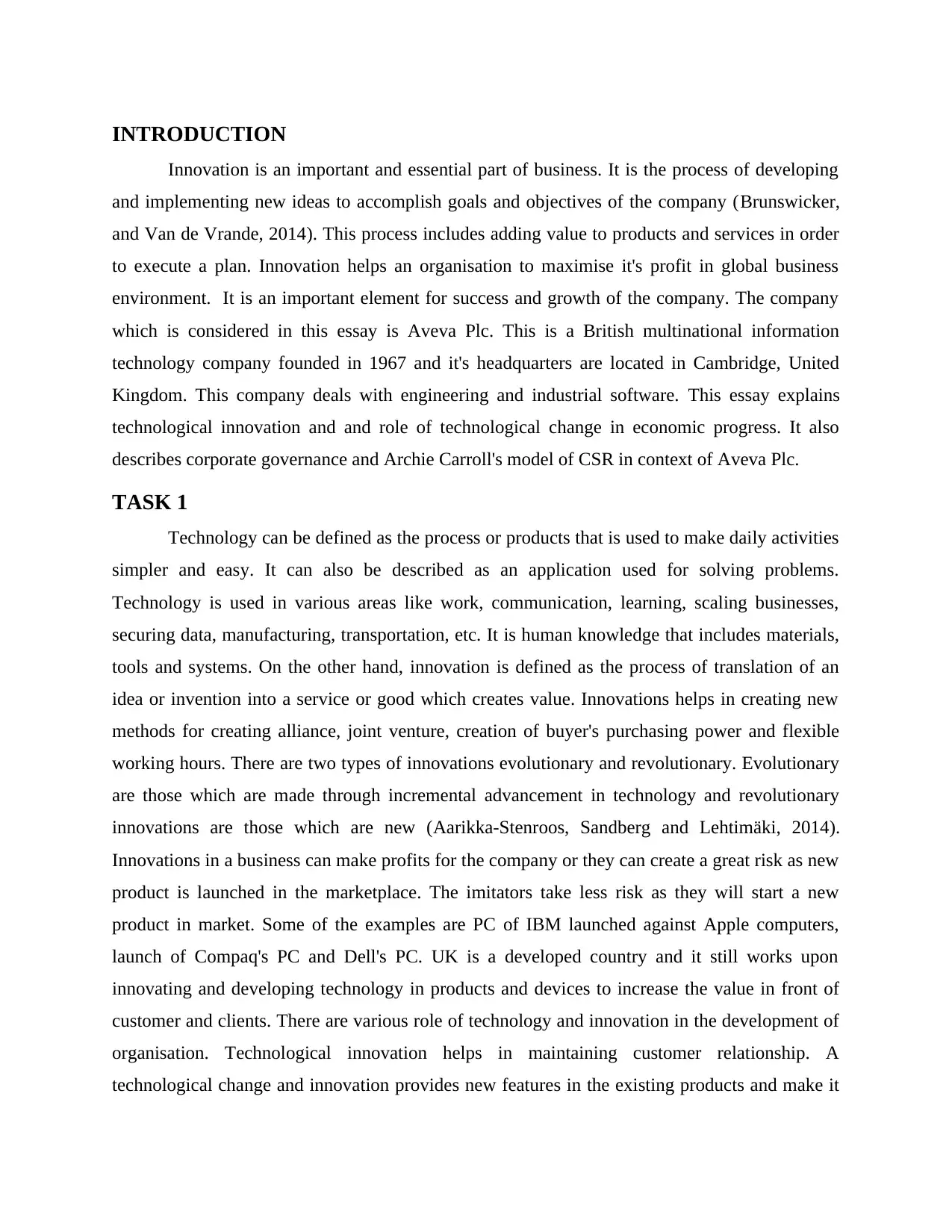
INTRODUCTION
Innovation is an important and essential part of business. It is the process of developing
and implementing new ideas to accomplish goals and objectives of the company (Brunswicker,
and Van de Vrande, 2014). This process includes adding value to products and services in order
to execute a plan. Innovation helps an organisation to maximise it's profit in global business
environment. It is an important element for success and growth of the company. The company
which is considered in this essay is Aveva Plc. This is a British multinational information
technology company founded in 1967 and it's headquarters are located in Cambridge, United
Kingdom. This company deals with engineering and industrial software. This essay explains
technological innovation and and role of technological change in economic progress. It also
describes corporate governance and Archie Carroll's model of CSR in context of Aveva Plc.
TASK 1
Technology can be defined as the process or products that is used to make daily activities
simpler and easy. It can also be described as an application used for solving problems.
Technology is used in various areas like work, communication, learning, scaling businesses,
securing data, manufacturing, transportation, etc. It is human knowledge that includes materials,
tools and systems. On the other hand, innovation is defined as the process of translation of an
idea or invention into a service or good which creates value. Innovations helps in creating new
methods for creating alliance, joint venture, creation of buyer's purchasing power and flexible
working hours. There are two types of innovations evolutionary and revolutionary. Evolutionary
are those which are made through incremental advancement in technology and revolutionary
innovations are those which are new (Aarikka-Stenroos, Sandberg and Lehtimäki, 2014).
Innovations in a business can make profits for the company or they can create a great risk as new
product is launched in the marketplace. The imitators take less risk as they will start a new
product in market. Some of the examples are PC of IBM launched against Apple computers,
launch of Compaq's PC and Dell's PC. UK is a developed country and it still works upon
innovating and developing technology in products and devices to increase the value in front of
customer and clients. There are various role of technology and innovation in the development of
organisation. Technological innovation helps in maintaining customer relationship. A
technological change and innovation provides new features in the existing products and make it
Innovation is an important and essential part of business. It is the process of developing
and implementing new ideas to accomplish goals and objectives of the company (Brunswicker,
and Van de Vrande, 2014). This process includes adding value to products and services in order
to execute a plan. Innovation helps an organisation to maximise it's profit in global business
environment. It is an important element for success and growth of the company. The company
which is considered in this essay is Aveva Plc. This is a British multinational information
technology company founded in 1967 and it's headquarters are located in Cambridge, United
Kingdom. This company deals with engineering and industrial software. This essay explains
technological innovation and and role of technological change in economic progress. It also
describes corporate governance and Archie Carroll's model of CSR in context of Aveva Plc.
TASK 1
Technology can be defined as the process or products that is used to make daily activities
simpler and easy. It can also be described as an application used for solving problems.
Technology is used in various areas like work, communication, learning, scaling businesses,
securing data, manufacturing, transportation, etc. It is human knowledge that includes materials,
tools and systems. On the other hand, innovation is defined as the process of translation of an
idea or invention into a service or good which creates value. Innovations helps in creating new
methods for creating alliance, joint venture, creation of buyer's purchasing power and flexible
working hours. There are two types of innovations evolutionary and revolutionary. Evolutionary
are those which are made through incremental advancement in technology and revolutionary
innovations are those which are new (Aarikka-Stenroos, Sandberg and Lehtimäki, 2014).
Innovations in a business can make profits for the company or they can create a great risk as new
product is launched in the marketplace. The imitators take less risk as they will start a new
product in market. Some of the examples are PC of IBM launched against Apple computers,
launch of Compaq's PC and Dell's PC. UK is a developed country and it still works upon
innovating and developing technology in products and devices to increase the value in front of
customer and clients. There are various role of technology and innovation in the development of
organisation. Technological innovation helps in maintaining customer relationship. A
technological change and innovation provides new features in the existing products and make it
⊘ This is a preview!⊘
Do you want full access?
Subscribe today to unlock all pages.

Trusted by 1+ million students worldwide
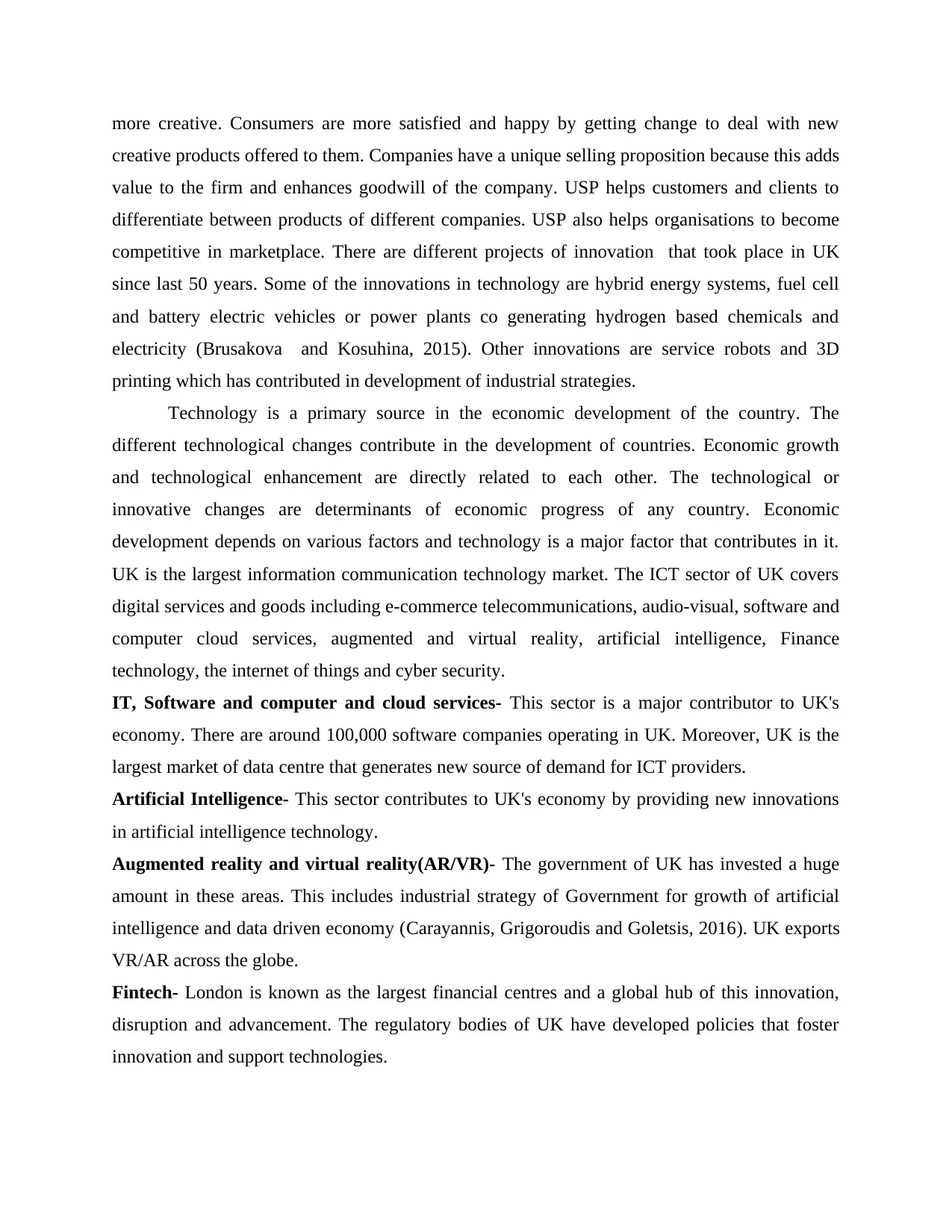
more creative. Consumers are more satisfied and happy by getting change to deal with new
creative products offered to them. Companies have a unique selling proposition because this adds
value to the firm and enhances goodwill of the company. USP helps customers and clients to
differentiate between products of different companies. USP also helps organisations to become
competitive in marketplace. There are different projects of innovation that took place in UK
since last 50 years. Some of the innovations in technology are hybrid energy systems, fuel cell
and battery electric vehicles or power plants co generating hydrogen based chemicals and
electricity (Brusakova and Kosuhina, 2015). Other innovations are service robots and 3D
printing which has contributed in development of industrial strategies.
Technology is a primary source in the economic development of the country. The
different technological changes contribute in the development of countries. Economic growth
and technological enhancement are directly related to each other. The technological or
innovative changes are determinants of economic progress of any country. Economic
development depends on various factors and technology is a major factor that contributes in it.
UK is the largest information communication technology market. The ICT sector of UK covers
digital services and goods including e-commerce telecommunications, audio-visual, software and
computer cloud services, augmented and virtual reality, artificial intelligence, Finance
technology, the internet of things and cyber security.
IT, Software and computer and cloud services- This sector is a major contributor to UK's
economy. There are around 100,000 software companies operating in UK. Moreover, UK is the
largest market of data centre that generates new source of demand for ICT providers.
Artificial Intelligence- This sector contributes to UK's economy by providing new innovations
in artificial intelligence technology.
Augmented reality and virtual reality(AR/VR)- The government of UK has invested a huge
amount in these areas. This includes industrial strategy of Government for growth of artificial
intelligence and data driven economy (Carayannis, Grigoroudis and Goletsis, 2016). UK exports
VR/AR across the globe.
Fintech- London is known as the largest financial centres and a global hub of this innovation,
disruption and advancement. The regulatory bodies of UK have developed policies that foster
innovation and support technologies.
creative products offered to them. Companies have a unique selling proposition because this adds
value to the firm and enhances goodwill of the company. USP helps customers and clients to
differentiate between products of different companies. USP also helps organisations to become
competitive in marketplace. There are different projects of innovation that took place in UK
since last 50 years. Some of the innovations in technology are hybrid energy systems, fuel cell
and battery electric vehicles or power plants co generating hydrogen based chemicals and
electricity (Brusakova and Kosuhina, 2015). Other innovations are service robots and 3D
printing which has contributed in development of industrial strategies.
Technology is a primary source in the economic development of the country. The
different technological changes contribute in the development of countries. Economic growth
and technological enhancement are directly related to each other. The technological or
innovative changes are determinants of economic progress of any country. Economic
development depends on various factors and technology is a major factor that contributes in it.
UK is the largest information communication technology market. The ICT sector of UK covers
digital services and goods including e-commerce telecommunications, audio-visual, software and
computer cloud services, augmented and virtual reality, artificial intelligence, Finance
technology, the internet of things and cyber security.
IT, Software and computer and cloud services- This sector is a major contributor to UK's
economy. There are around 100,000 software companies operating in UK. Moreover, UK is the
largest market of data centre that generates new source of demand for ICT providers.
Artificial Intelligence- This sector contributes to UK's economy by providing new innovations
in artificial intelligence technology.
Augmented reality and virtual reality(AR/VR)- The government of UK has invested a huge
amount in these areas. This includes industrial strategy of Government for growth of artificial
intelligence and data driven economy (Carayannis, Grigoroudis and Goletsis, 2016). UK exports
VR/AR across the globe.
Fintech- London is known as the largest financial centres and a global hub of this innovation,
disruption and advancement. The regulatory bodies of UK have developed policies that foster
innovation and support technologies.
Paraphrase This Document
Need a fresh take? Get an instant paraphrase of this document with our AI Paraphraser
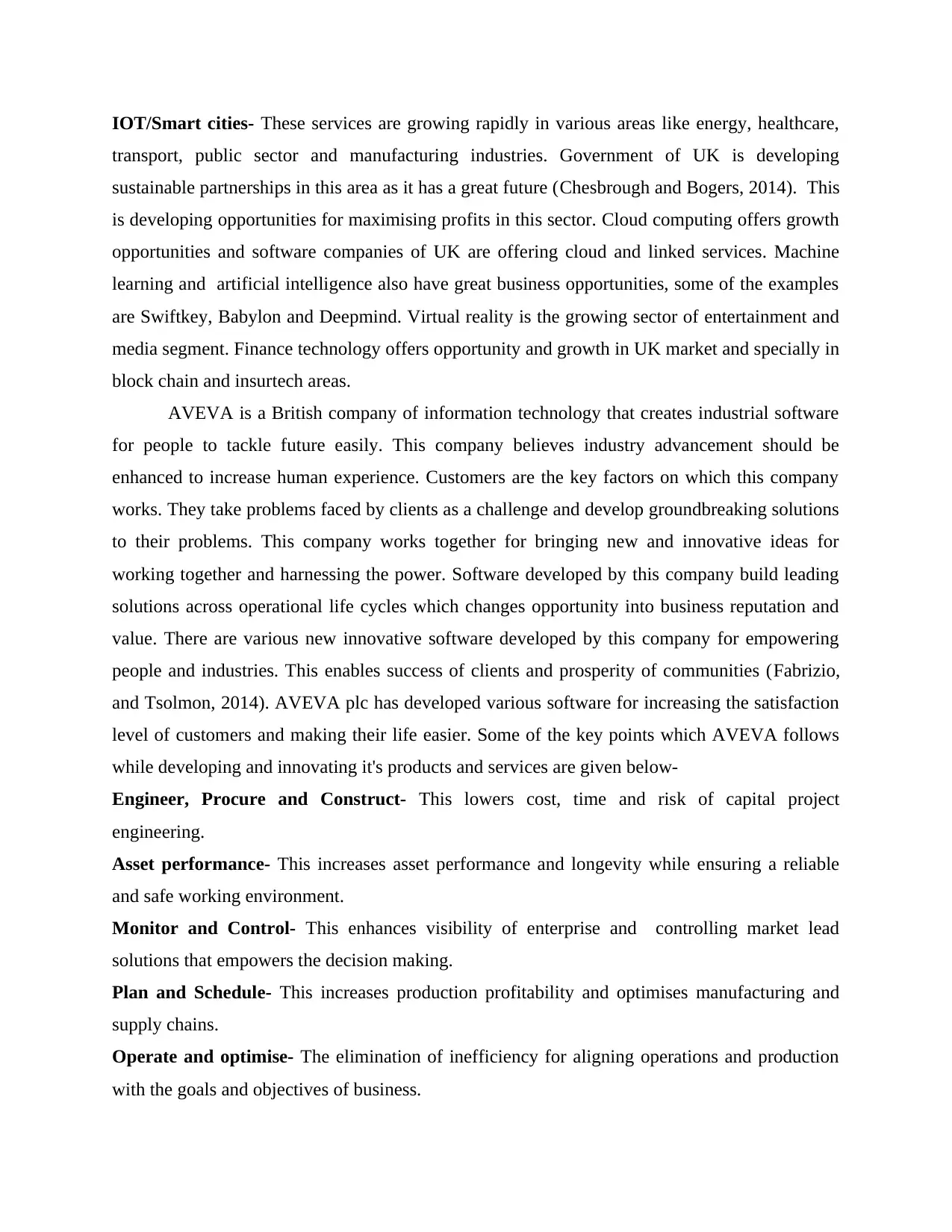
IOT/Smart cities- These services are growing rapidly in various areas like energy, healthcare,
transport, public sector and manufacturing industries. Government of UK is developing
sustainable partnerships in this area as it has a great future (Chesbrough and Bogers, 2014). This
is developing opportunities for maximising profits in this sector. Cloud computing offers growth
opportunities and software companies of UK are offering cloud and linked services. Machine
learning and artificial intelligence also have great business opportunities, some of the examples
are Swiftkey, Babylon and Deepmind. Virtual reality is the growing sector of entertainment and
media segment. Finance technology offers opportunity and growth in UK market and specially in
block chain and insurtech areas.
AVEVA is a British company of information technology that creates industrial software
for people to tackle future easily. This company believes industry advancement should be
enhanced to increase human experience. Customers are the key factors on which this company
works. They take problems faced by clients as a challenge and develop groundbreaking solutions
to their problems. This company works together for bringing new and innovative ideas for
working together and harnessing the power. Software developed by this company build leading
solutions across operational life cycles which changes opportunity into business reputation and
value. There are various new innovative software developed by this company for empowering
people and industries. This enables success of clients and prosperity of communities (Fabrizio,
and Tsolmon, 2014). AVEVA plc has developed various software for increasing the satisfaction
level of customers and making their life easier. Some of the key points which AVEVA follows
while developing and innovating it's products and services are given below-
Engineer, Procure and Construct- This lowers cost, time and risk of capital project
engineering.
Asset performance- This increases asset performance and longevity while ensuring a reliable
and safe working environment.
Monitor and Control- This enhances visibility of enterprise and controlling market lead
solutions that empowers the decision making.
Plan and Schedule- This increases production profitability and optimises manufacturing and
supply chains.
Operate and optimise- The elimination of inefficiency for aligning operations and production
with the goals and objectives of business.
transport, public sector and manufacturing industries. Government of UK is developing
sustainable partnerships in this area as it has a great future (Chesbrough and Bogers, 2014). This
is developing opportunities for maximising profits in this sector. Cloud computing offers growth
opportunities and software companies of UK are offering cloud and linked services. Machine
learning and artificial intelligence also have great business opportunities, some of the examples
are Swiftkey, Babylon and Deepmind. Virtual reality is the growing sector of entertainment and
media segment. Finance technology offers opportunity and growth in UK market and specially in
block chain and insurtech areas.
AVEVA is a British company of information technology that creates industrial software
for people to tackle future easily. This company believes industry advancement should be
enhanced to increase human experience. Customers are the key factors on which this company
works. They take problems faced by clients as a challenge and develop groundbreaking solutions
to their problems. This company works together for bringing new and innovative ideas for
working together and harnessing the power. Software developed by this company build leading
solutions across operational life cycles which changes opportunity into business reputation and
value. There are various new innovative software developed by this company for empowering
people and industries. This enables success of clients and prosperity of communities (Fabrizio,
and Tsolmon, 2014). AVEVA plc has developed various software for increasing the satisfaction
level of customers and making their life easier. Some of the key points which AVEVA follows
while developing and innovating it's products and services are given below-
Engineer, Procure and Construct- This lowers cost, time and risk of capital project
engineering.
Asset performance- This increases asset performance and longevity while ensuring a reliable
and safe working environment.
Monitor and Control- This enhances visibility of enterprise and controlling market lead
solutions that empowers the decision making.
Plan and Schedule- This increases production profitability and optimises manufacturing and
supply chains.
Operate and optimise- The elimination of inefficiency for aligning operations and production
with the goals and objectives of business.
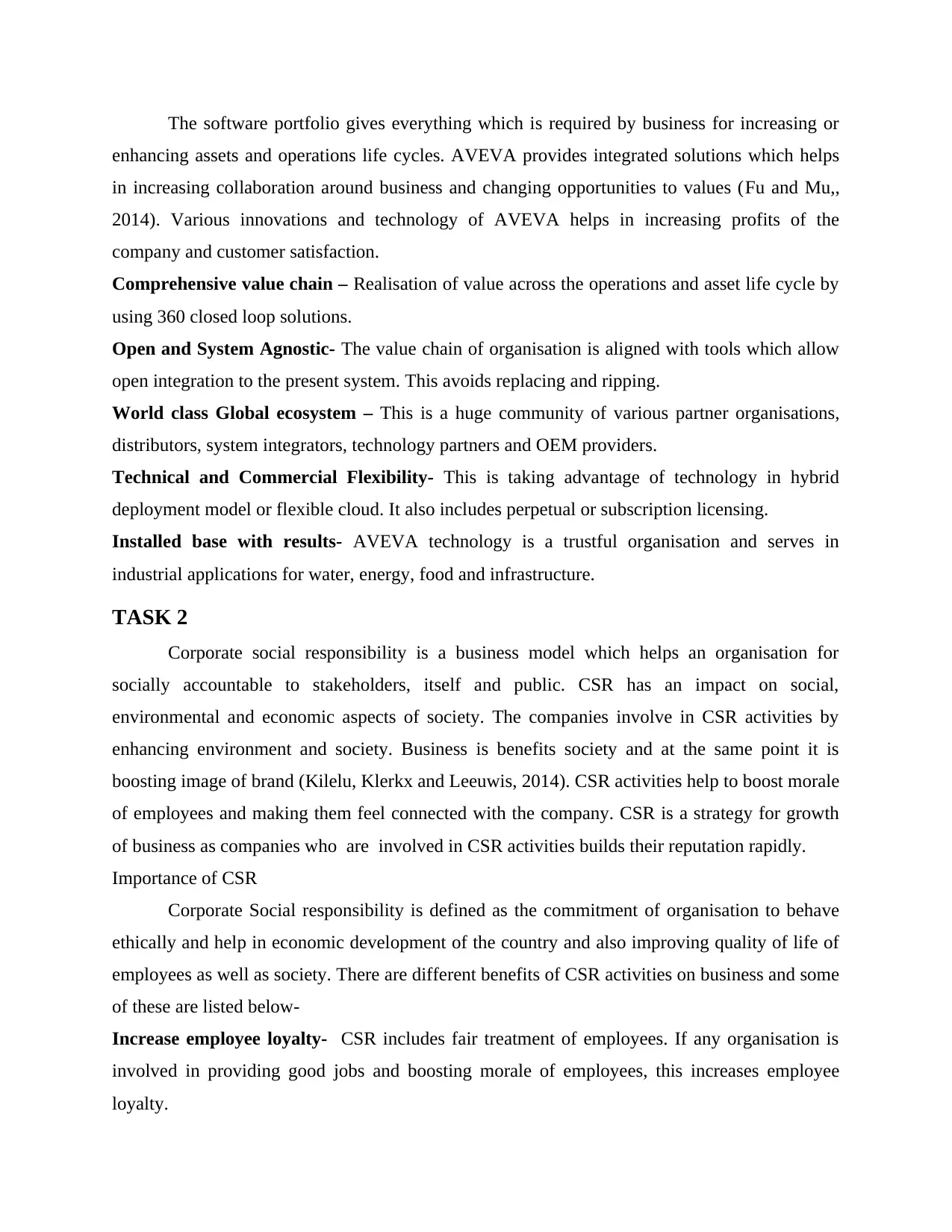
The software portfolio gives everything which is required by business for increasing or
enhancing assets and operations life cycles. AVEVA provides integrated solutions which helps
in increasing collaboration around business and changing opportunities to values (Fu and Mu,,
2014). Various innovations and technology of AVEVA helps in increasing profits of the
company and customer satisfaction.
Comprehensive value chain – Realisation of value across the operations and asset life cycle by
using 360 closed loop solutions.
Open and System Agnostic- The value chain of organisation is aligned with tools which allow
open integration to the present system. This avoids replacing and ripping.
World class Global ecosystem – This is a huge community of various partner organisations,
distributors, system integrators, technology partners and OEM providers.
Technical and Commercial Flexibility- This is taking advantage of technology in hybrid
deployment model or flexible cloud. It also includes perpetual or subscription licensing.
Installed base with results- AVEVA technology is a trustful organisation and serves in
industrial applications for water, energy, food and infrastructure.
TASK 2
Corporate social responsibility is a business model which helps an organisation for
socially accountable to stakeholders, itself and public. CSR has an impact on social,
environmental and economic aspects of society. The companies involve in CSR activities by
enhancing environment and society. Business is benefits society and at the same point it is
boosting image of brand (Kilelu, Klerkx and Leeuwis, 2014). CSR activities help to boost morale
of employees and making them feel connected with the company. CSR is a strategy for growth
of business as companies who are involved in CSR activities builds their reputation rapidly.
Importance of CSR
Corporate Social responsibility is defined as the commitment of organisation to behave
ethically and help in economic development of the country and also improving quality of life of
employees as well as society. There are different benefits of CSR activities on business and some
of these are listed below-
Increase employee loyalty- CSR includes fair treatment of employees. If any organisation is
involved in providing good jobs and boosting morale of employees, this increases employee
loyalty.
enhancing assets and operations life cycles. AVEVA provides integrated solutions which helps
in increasing collaboration around business and changing opportunities to values (Fu and Mu,,
2014). Various innovations and technology of AVEVA helps in increasing profits of the
company and customer satisfaction.
Comprehensive value chain – Realisation of value across the operations and asset life cycle by
using 360 closed loop solutions.
Open and System Agnostic- The value chain of organisation is aligned with tools which allow
open integration to the present system. This avoids replacing and ripping.
World class Global ecosystem – This is a huge community of various partner organisations,
distributors, system integrators, technology partners and OEM providers.
Technical and Commercial Flexibility- This is taking advantage of technology in hybrid
deployment model or flexible cloud. It also includes perpetual or subscription licensing.
Installed base with results- AVEVA technology is a trustful organisation and serves in
industrial applications for water, energy, food and infrastructure.
TASK 2
Corporate social responsibility is a business model which helps an organisation for
socially accountable to stakeholders, itself and public. CSR has an impact on social,
environmental and economic aspects of society. The companies involve in CSR activities by
enhancing environment and society. Business is benefits society and at the same point it is
boosting image of brand (Kilelu, Klerkx and Leeuwis, 2014). CSR activities help to boost morale
of employees and making them feel connected with the company. CSR is a strategy for growth
of business as companies who are involved in CSR activities builds their reputation rapidly.
Importance of CSR
Corporate Social responsibility is defined as the commitment of organisation to behave
ethically and help in economic development of the country and also improving quality of life of
employees as well as society. There are different benefits of CSR activities on business and some
of these are listed below-
Increase employee loyalty- CSR includes fair treatment of employees. If any organisation is
involved in providing good jobs and boosting morale of employees, this increases employee
loyalty.
⊘ This is a preview!⊘
Do you want full access?
Subscribe today to unlock all pages.

Trusted by 1+ million students worldwide
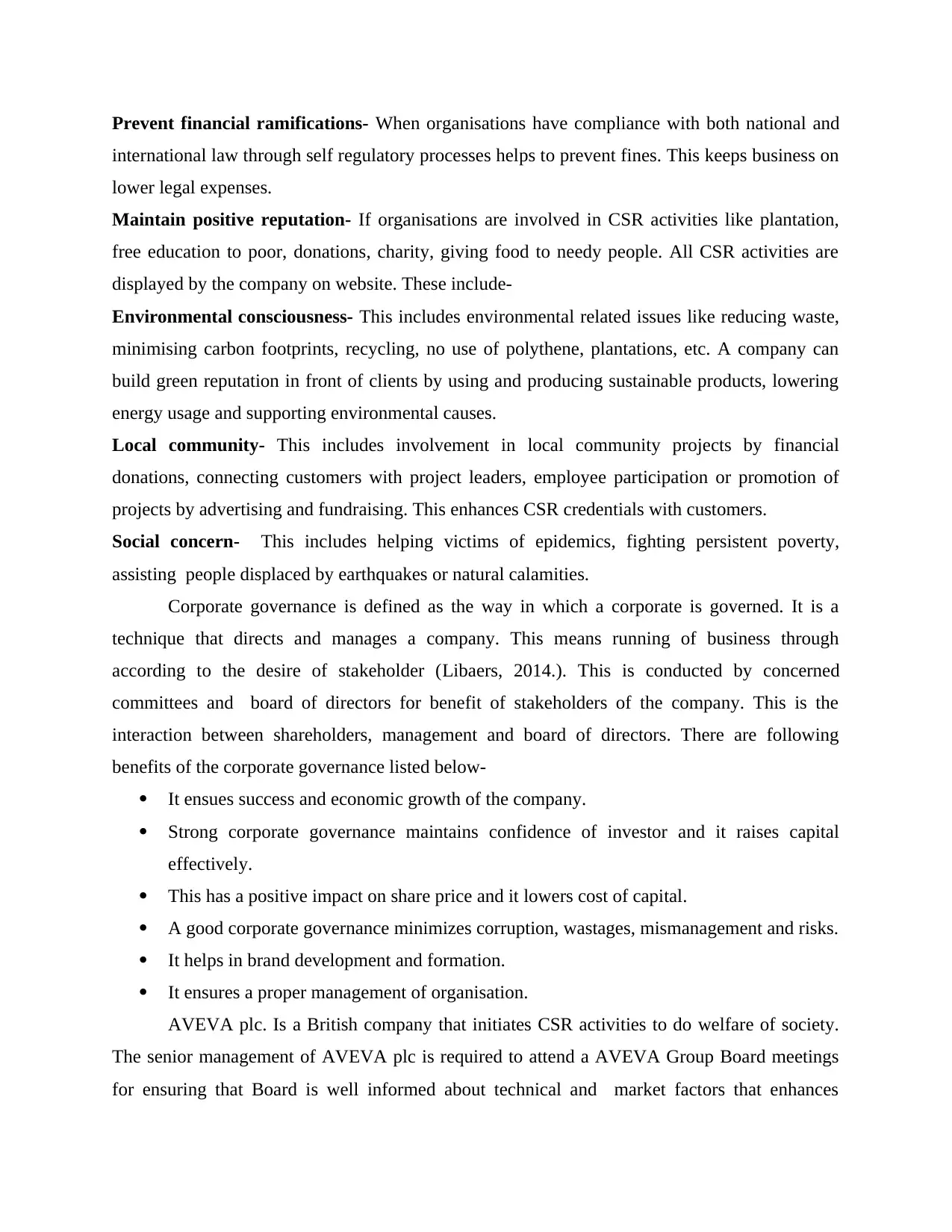
Prevent financial ramifications- When organisations have compliance with both national and
international law through self regulatory processes helps to prevent fines. This keeps business on
lower legal expenses.
Maintain positive reputation- If organisations are involved in CSR activities like plantation,
free education to poor, donations, charity, giving food to needy people. All CSR activities are
displayed by the company on website. These include-
Environmental consciousness- This includes environmental related issues like reducing waste,
minimising carbon footprints, recycling, no use of polythene, plantations, etc. A company can
build green reputation in front of clients by using and producing sustainable products, lowering
energy usage and supporting environmental causes.
Local community- This includes involvement in local community projects by financial
donations, connecting customers with project leaders, employee participation or promotion of
projects by advertising and fundraising. This enhances CSR credentials with customers.
Social concern- This includes helping victims of epidemics, fighting persistent poverty,
assisting people displaced by earthquakes or natural calamities.
Corporate governance is defined as the way in which a corporate is governed. It is a
technique that directs and manages a company. This means running of business through
according to the desire of stakeholder (Libaers, 2014.). This is conducted by concerned
committees and board of directors for benefit of stakeholders of the company. This is the
interaction between shareholders, management and board of directors. There are following
benefits of the corporate governance listed below-
It ensues success and economic growth of the company.
Strong corporate governance maintains confidence of investor and it raises capital
effectively.
This has a positive impact on share price and it lowers cost of capital.
A good corporate governance minimizes corruption, wastages, mismanagement and risks.
It helps in brand development and formation.
It ensures a proper management of organisation.
AVEVA plc. Is a British company that initiates CSR activities to do welfare of society.
The senior management of AVEVA plc is required to attend a AVEVA Group Board meetings
for ensuring that Board is well informed about technical and market factors that enhances
international law through self regulatory processes helps to prevent fines. This keeps business on
lower legal expenses.
Maintain positive reputation- If organisations are involved in CSR activities like plantation,
free education to poor, donations, charity, giving food to needy people. All CSR activities are
displayed by the company on website. These include-
Environmental consciousness- This includes environmental related issues like reducing waste,
minimising carbon footprints, recycling, no use of polythene, plantations, etc. A company can
build green reputation in front of clients by using and producing sustainable products, lowering
energy usage and supporting environmental causes.
Local community- This includes involvement in local community projects by financial
donations, connecting customers with project leaders, employee participation or promotion of
projects by advertising and fundraising. This enhances CSR credentials with customers.
Social concern- This includes helping victims of epidemics, fighting persistent poverty,
assisting people displaced by earthquakes or natural calamities.
Corporate governance is defined as the way in which a corporate is governed. It is a
technique that directs and manages a company. This means running of business through
according to the desire of stakeholder (Libaers, 2014.). This is conducted by concerned
committees and board of directors for benefit of stakeholders of the company. This is the
interaction between shareholders, management and board of directors. There are following
benefits of the corporate governance listed below-
It ensues success and economic growth of the company.
Strong corporate governance maintains confidence of investor and it raises capital
effectively.
This has a positive impact on share price and it lowers cost of capital.
A good corporate governance minimizes corruption, wastages, mismanagement and risks.
It helps in brand development and formation.
It ensures a proper management of organisation.
AVEVA plc. Is a British company that initiates CSR activities to do welfare of society.
The senior management of AVEVA plc is required to attend a AVEVA Group Board meetings
for ensuring that Board is well informed about technical and market factors that enhances
Paraphrase This Document
Need a fresh take? Get an instant paraphrase of this document with our AI Paraphraser
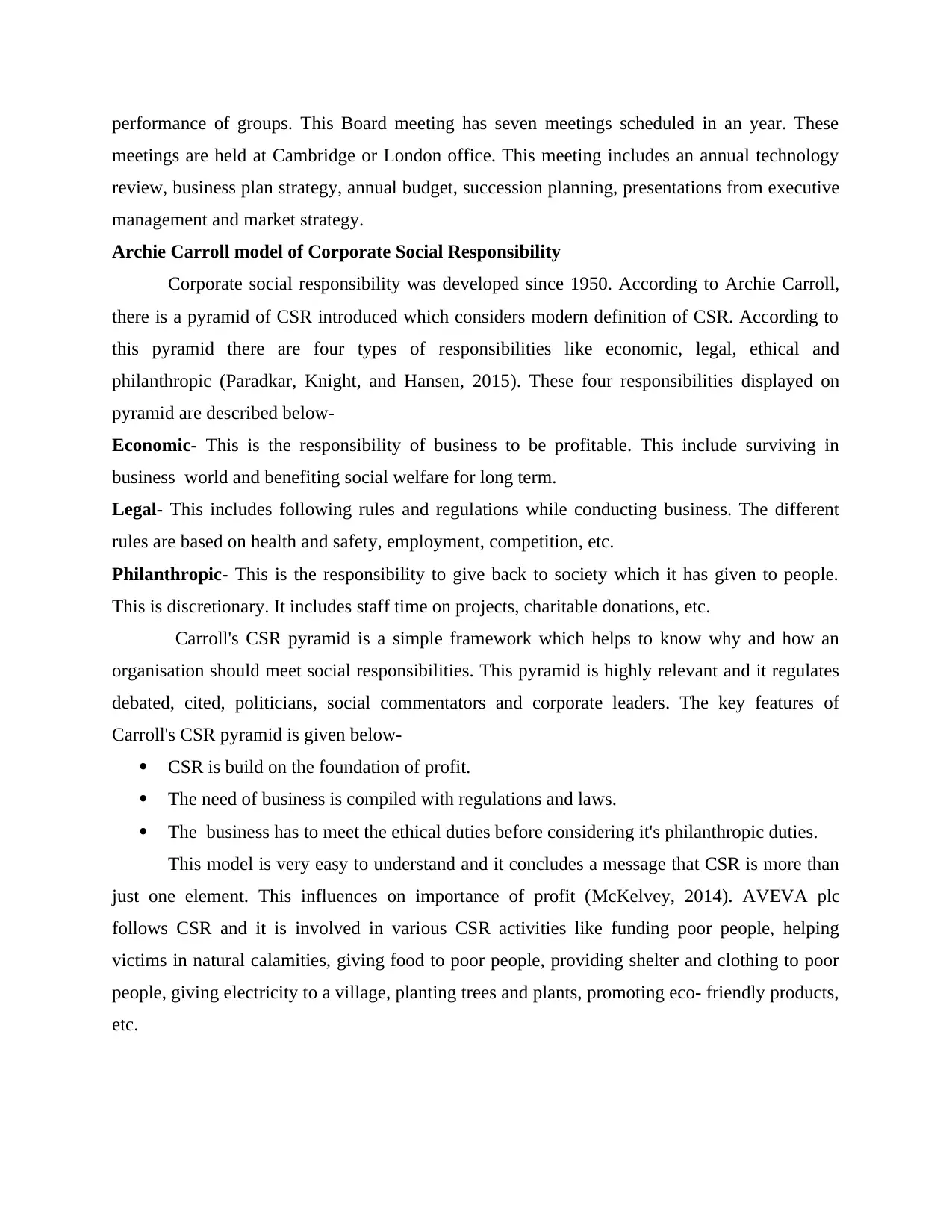
performance of groups. This Board meeting has seven meetings scheduled in an year. These
meetings are held at Cambridge or London office. This meeting includes an annual technology
review, business plan strategy, annual budget, succession planning, presentations from executive
management and market strategy.
Archie Carroll model of Corporate Social Responsibility
Corporate social responsibility was developed since 1950. According to Archie Carroll,
there is a pyramid of CSR introduced which considers modern definition of CSR. According to
this pyramid there are four types of responsibilities like economic, legal, ethical and
philanthropic (Paradkar, Knight, and Hansen, 2015). These four responsibilities displayed on
pyramid are described below-
Economic- This is the responsibility of business to be profitable. This include surviving in
business world and benefiting social welfare for long term.
Legal- This includes following rules and regulations while conducting business. The different
rules are based on health and safety, employment, competition, etc.
Philanthropic- This is the responsibility to give back to society which it has given to people.
This is discretionary. It includes staff time on projects, charitable donations, etc.
Carroll's CSR pyramid is a simple framework which helps to know why and how an
organisation should meet social responsibilities. This pyramid is highly relevant and it regulates
debated, cited, politicians, social commentators and corporate leaders. The key features of
Carroll's CSR pyramid is given below-
CSR is build on the foundation of profit.
The need of business is compiled with regulations and laws.
The business has to meet the ethical duties before considering it's philanthropic duties.
This model is very easy to understand and it concludes a message that CSR is more than
just one element. This influences on importance of profit (McKelvey, 2014). AVEVA plc
follows CSR and it is involved in various CSR activities like funding poor people, helping
victims in natural calamities, giving food to poor people, providing shelter and clothing to poor
people, giving electricity to a village, planting trees and plants, promoting eco- friendly products,
etc.
meetings are held at Cambridge or London office. This meeting includes an annual technology
review, business plan strategy, annual budget, succession planning, presentations from executive
management and market strategy.
Archie Carroll model of Corporate Social Responsibility
Corporate social responsibility was developed since 1950. According to Archie Carroll,
there is a pyramid of CSR introduced which considers modern definition of CSR. According to
this pyramid there are four types of responsibilities like economic, legal, ethical and
philanthropic (Paradkar, Knight, and Hansen, 2015). These four responsibilities displayed on
pyramid are described below-
Economic- This is the responsibility of business to be profitable. This include surviving in
business world and benefiting social welfare for long term.
Legal- This includes following rules and regulations while conducting business. The different
rules are based on health and safety, employment, competition, etc.
Philanthropic- This is the responsibility to give back to society which it has given to people.
This is discretionary. It includes staff time on projects, charitable donations, etc.
Carroll's CSR pyramid is a simple framework which helps to know why and how an
organisation should meet social responsibilities. This pyramid is highly relevant and it regulates
debated, cited, politicians, social commentators and corporate leaders. The key features of
Carroll's CSR pyramid is given below-
CSR is build on the foundation of profit.
The need of business is compiled with regulations and laws.
The business has to meet the ethical duties before considering it's philanthropic duties.
This model is very easy to understand and it concludes a message that CSR is more than
just one element. This influences on importance of profit (McKelvey, 2014). AVEVA plc
follows CSR and it is involved in various CSR activities like funding poor people, helping
victims in natural calamities, giving food to poor people, providing shelter and clothing to poor
people, giving electricity to a village, planting trees and plants, promoting eco- friendly products,
etc.
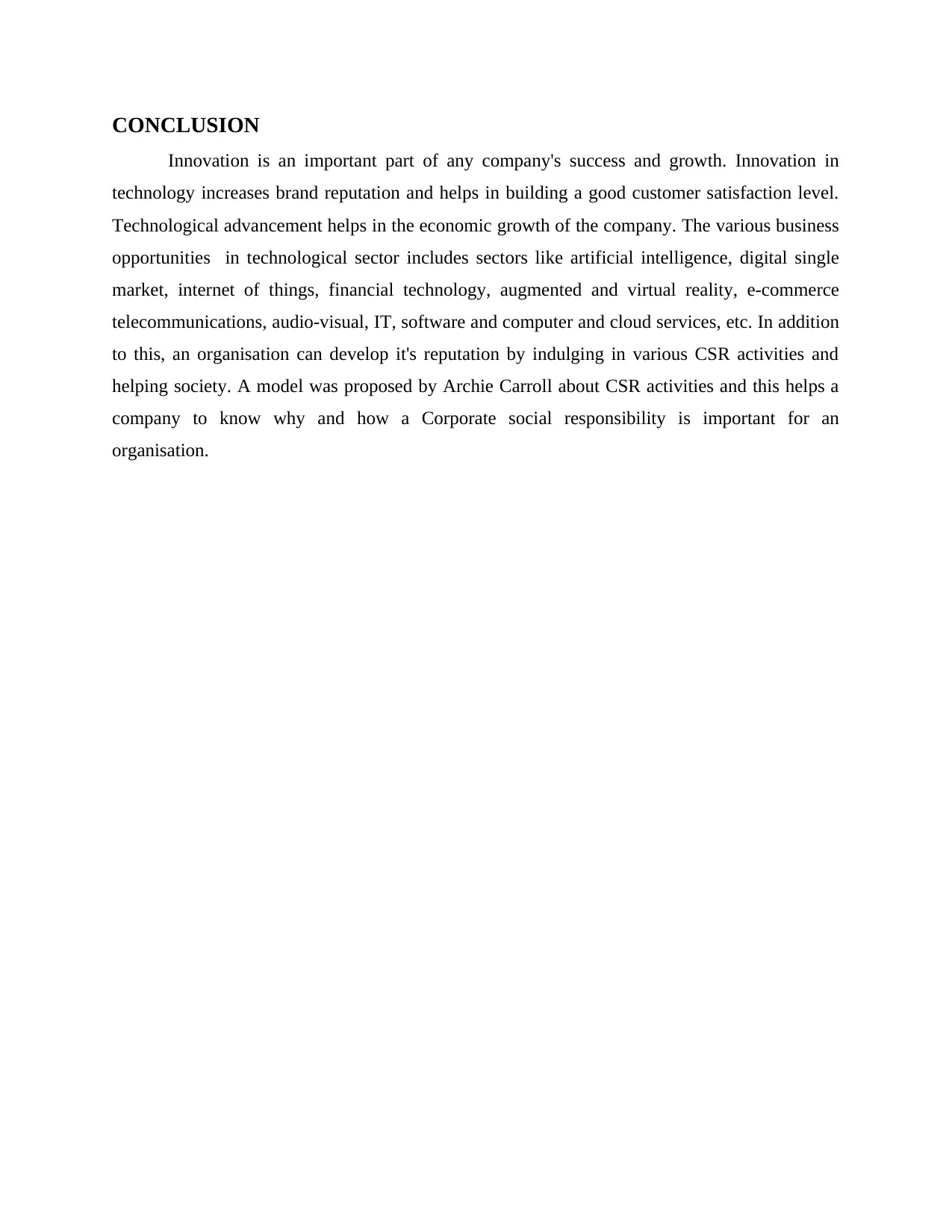
CONCLUSION
Innovation is an important part of any company's success and growth. Innovation in
technology increases brand reputation and helps in building a good customer satisfaction level.
Technological advancement helps in the economic growth of the company. The various business
opportunities in technological sector includes sectors like artificial intelligence, digital single
market, internet of things, financial technology, augmented and virtual reality, e-commerce
telecommunications, audio-visual, IT, software and computer and cloud services, etc. In addition
to this, an organisation can develop it's reputation by indulging in various CSR activities and
helping society. A model was proposed by Archie Carroll about CSR activities and this helps a
company to know why and how a Corporate social responsibility is important for an
organisation.
Innovation is an important part of any company's success and growth. Innovation in
technology increases brand reputation and helps in building a good customer satisfaction level.
Technological advancement helps in the economic growth of the company. The various business
opportunities in technological sector includes sectors like artificial intelligence, digital single
market, internet of things, financial technology, augmented and virtual reality, e-commerce
telecommunications, audio-visual, IT, software and computer and cloud services, etc. In addition
to this, an organisation can develop it's reputation by indulging in various CSR activities and
helping society. A model was proposed by Archie Carroll about CSR activities and this helps a
company to know why and how a Corporate social responsibility is important for an
organisation.
⊘ This is a preview!⊘
Do you want full access?
Subscribe today to unlock all pages.

Trusted by 1+ million students worldwide
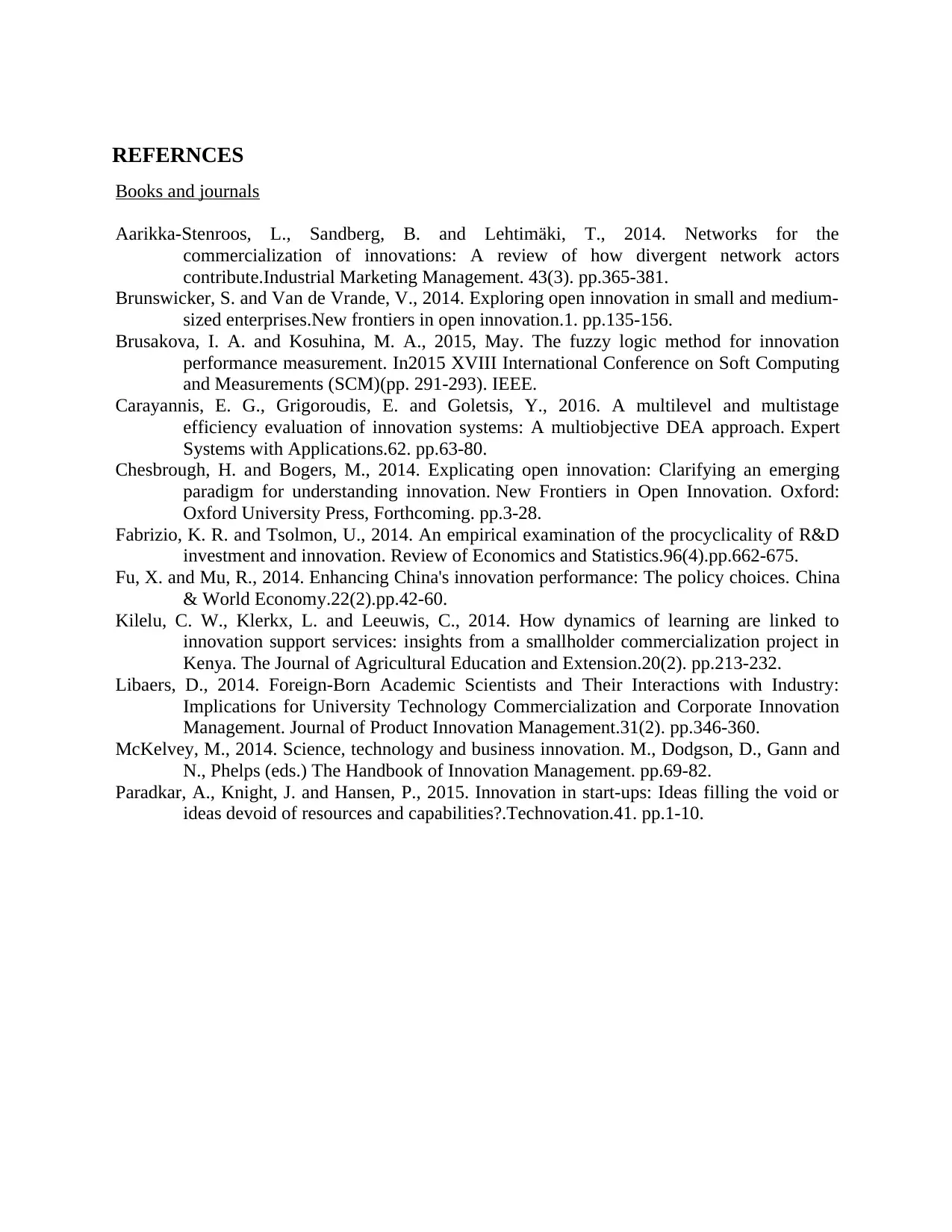
REFERNCES
Books and journals
Aarikka-Stenroos, L., Sandberg, B. and Lehtimäki, T., 2014. Networks for the
commercialization of innovations: A review of how divergent network actors
contribute.Industrial Marketing Management. 43(3). pp.365-381.
Brunswicker, S. and Van de Vrande, V., 2014. Exploring open innovation in small and medium-
sized enterprises.New frontiers in open innovation.1. pp.135-156.
Brusakova, I. A. and Kosuhina, M. A., 2015, May. The fuzzy logic method for innovation
performance measurement. In2015 XVIII International Conference on Soft Computing
and Measurements (SCM)(pp. 291-293). IEEE.
Carayannis, E. G., Grigoroudis, E. and Goletsis, Y., 2016. A multilevel and multistage
efficiency evaluation of innovation systems: A multiobjective DEA approach. Expert
Systems with Applications.62. pp.63-80.
Chesbrough, H. and Bogers, M., 2014. Explicating open innovation: Clarifying an emerging
paradigm for understanding innovation. New Frontiers in Open Innovation. Oxford:
Oxford University Press, Forthcoming. pp.3-28.
Fabrizio, K. R. and Tsolmon, U., 2014. An empirical examination of the procyclicality of R&D
investment and innovation. Review of Economics and Statistics.96(4).pp.662-675.
Fu, X. and Mu, R., 2014. Enhancing China's innovation performance: The policy choices. China
& World Economy.22(2).pp.42-60.
Kilelu, C. W., Klerkx, L. and Leeuwis, C., 2014. How dynamics of learning are linked to
innovation support services: insights from a smallholder commercialization project in
Kenya. The Journal of Agricultural Education and Extension.20(2). pp.213-232.
Libaers, D., 2014. Foreign‐Born Academic Scientists and Their Interactions with Industry:
Implications for University Technology Commercialization and Corporate Innovation
Management. Journal of Product Innovation Management.31(2). pp.346-360.
McKelvey, M., 2014. Science, technology and business innovation. M., Dodgson, D., Gann and
N., Phelps (eds.) The Handbook of Innovation Management. pp.69-82.
Paradkar, A., Knight, J. and Hansen, P., 2015. Innovation in start-ups: Ideas filling the void or
ideas devoid of resources and capabilities?.Technovation.41. pp.1-10.
Books and journals
Aarikka-Stenroos, L., Sandberg, B. and Lehtimäki, T., 2014. Networks for the
commercialization of innovations: A review of how divergent network actors
contribute.Industrial Marketing Management. 43(3). pp.365-381.
Brunswicker, S. and Van de Vrande, V., 2014. Exploring open innovation in small and medium-
sized enterprises.New frontiers in open innovation.1. pp.135-156.
Brusakova, I. A. and Kosuhina, M. A., 2015, May. The fuzzy logic method for innovation
performance measurement. In2015 XVIII International Conference on Soft Computing
and Measurements (SCM)(pp. 291-293). IEEE.
Carayannis, E. G., Grigoroudis, E. and Goletsis, Y., 2016. A multilevel and multistage
efficiency evaluation of innovation systems: A multiobjective DEA approach. Expert
Systems with Applications.62. pp.63-80.
Chesbrough, H. and Bogers, M., 2014. Explicating open innovation: Clarifying an emerging
paradigm for understanding innovation. New Frontiers in Open Innovation. Oxford:
Oxford University Press, Forthcoming. pp.3-28.
Fabrizio, K. R. and Tsolmon, U., 2014. An empirical examination of the procyclicality of R&D
investment and innovation. Review of Economics and Statistics.96(4).pp.662-675.
Fu, X. and Mu, R., 2014. Enhancing China's innovation performance: The policy choices. China
& World Economy.22(2).pp.42-60.
Kilelu, C. W., Klerkx, L. and Leeuwis, C., 2014. How dynamics of learning are linked to
innovation support services: insights from a smallholder commercialization project in
Kenya. The Journal of Agricultural Education and Extension.20(2). pp.213-232.
Libaers, D., 2014. Foreign‐Born Academic Scientists and Their Interactions with Industry:
Implications for University Technology Commercialization and Corporate Innovation
Management. Journal of Product Innovation Management.31(2). pp.346-360.
McKelvey, M., 2014. Science, technology and business innovation. M., Dodgson, D., Gann and
N., Phelps (eds.) The Handbook of Innovation Management. pp.69-82.
Paradkar, A., Knight, J. and Hansen, P., 2015. Innovation in start-ups: Ideas filling the void or
ideas devoid of resources and capabilities?.Technovation.41. pp.1-10.
1 out of 10
Related Documents
Your All-in-One AI-Powered Toolkit for Academic Success.
+13062052269
info@desklib.com
Available 24*7 on WhatsApp / Email
![[object Object]](/_next/static/media/star-bottom.7253800d.svg)
Unlock your academic potential
Copyright © 2020–2026 A2Z Services. All Rights Reserved. Developed and managed by ZUCOL.





